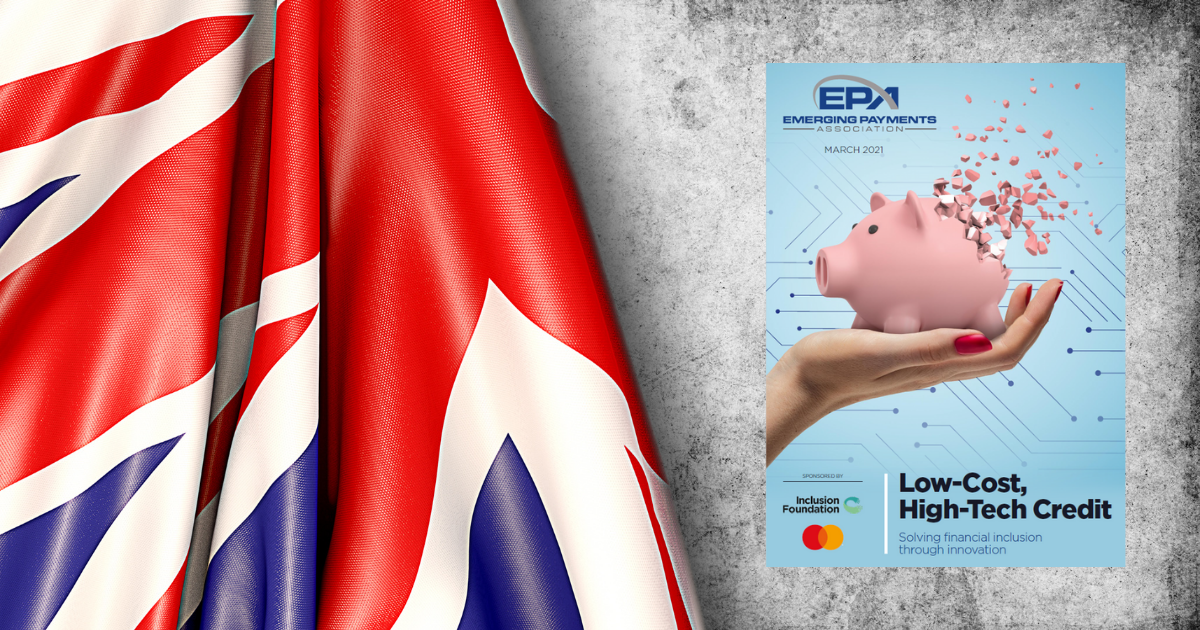New report shows that the 10 million UK adults excluded from affordable credit who need to manage irregular income cycles are increasingly able to access the funds they need through Fintech
London, UK – 04th March 2021: The Emerging Payments Association (EPA), which promotes collaboration and innovation across payments, has today published a new paper that shows the serious problem of financial exclusion in the UK and how innovation in Fintech can allow people to access affordable credit. This comes at a time when over 10 million adults in the UK cannot access affordable credit, often because of low credit scores or badly designed credit products. However, new financial technology, most notably inclusive credit, can offer a way out of precarity for millions of people.
Having endured a year since the start of the COVID-19 pandemic and the economic hardship it entailed, the UK looks set to rebound as Chancellor of the Exchequer Rishi Sunak revealed his 2021 financial budget yesterday. Undoubtedly, many citizens of the UK are worse off than they were this time last year, and with insecure incomes, a job that has been furloughed or no job at all, many people are turning to credit to cover monthly expenditure against income losses. However, the current market does not cater for this increase in demand – instead, over 10 million adults cannot access affordable credit, a problem known as financial exclusion.
The credit arena has not seen enough innovation, and due to consumer protection regulation and an uncompetitive market, consumers are forced to turn to high-cost credit (often so-called ‘payday loans’), which can trigger a spiral into debt, with 14.2 million people currently at risk of ‘problem debt’. However, the report ‘Low-Cost, High-Tech Credit: Solving financial inclusion through innovation’, released today, seeks to inform policy-makers and the regulators across the Fintech and payments community about the difficult challenges consumers are facing, whilst also highlighting some of the inclusive Fintech companies who are helping them.
Insight for the report was collected through 10 in-depth interviews with industry stakeholders from charity organisations, Fintechs, credit providers and academic institutions and is split into four key sections:
- Consumer Credit: Highlighting why people use credit, why it costs the consumer so much right now and how the lack of tailored credit products, both in product design and the business models of providers, is a definitive cause of financial exclusion.
- Financial Exclusion: Explaining why people cannot access credit and can therefore fall into problem debt. It also details the harm that this high-priced credit and financial exclusion can cause.
- Inclusive Fintech: Fintech firms are well-placed to shake up the market and make affordable credit available to millions more people. The report showcases key areas of innovation, including improved customer data, new means of assessing and decreasing risk, inclusive product design and alternative business models.
- Market Overview: Exploring several Fintech firms disrupting the credit landscape today. These firms are innovating in areas like credit building, using open banking to assess lending risk and buy now, pay later schemes to enable lower cost and risk for both parties. The report also seeks to provide a market overview of the Fintech firms that are well-placed to shake-up the market and make affordable credit available to millions of people.
Tony Craddock, Director General of the Emerging Payments Association, commented: “With the industry changing at pace, it is important we don’t leave people behind. We have already seen many turning to short-term credit sources to make ends meet through the pandemic. However, whilst the demand for affordable credit has increased, supply has diminished. Our industry must adapt its products to fit in with people’s lives rather than having products that leave many behind.”
Josh Berle, Business Development Director, Mastercard, and Lead of EPA Project Inclusion, added: “We’re excited to have produced this important assessment of the market for affordable credit – which is more important than ever given current economic circumstances. I’m particularly proud that Project Inclusion has been able to mobilise over the past year to add critical value in such a range of related arenas despite the impact of the pandemic on our prior working practices.”
EPA’s Project Inclusion aims to drive industry activity to address financial exclusion and to provide clarity on Fintech innovations and solutions that reduce financial exclusion. This report is part of Project Inclusion’s work programme, seeking to highlight examples of best practice by payment firms and by encouraging others to think and reflect on how they can support these groups at risk of exclusion.
To download your copy of the report, please visit: www.emergingpayments.org/whitepaper/low-cost-high-tech-credit-sponsored-by-solving-financial-inclusion-through-innovation/
For more information on the work and services of the EPA you can visit: www.emergingpayments.org you can speak directly to the EPA at: [email protected]
[mkdf_separator class_name=”” type=”normal” position=”center” color=”” border_style=”” width=”” thickness=”” top_margin=”” bottom_margin=””]
About the EPA
The Emerging Payments Association (EPA), established in 2008, sets out to make payments work for everyone. To achieve this, it runs a comprehensive programme of activities for members with guidance from an independent Advisory Board of 17 payments CEOs.
These activities include a programme of digital and (when possible) face-to-face events including an online annual conference and broadcast awards dinner, numerous briefings and webinars, CEO Round Tables, and networking and training activities. The EPA also runs six stakeholder working groups. More than 100 volunteers collaborate on the important challenges facing our industry today, such as financial inclusion, recovering from Covid-19, financial crime, regulation, access to banking and promoting the UK globally. The EPA also produces research papers and reports to shed light on the big issues of the day and works closely with industry stakeholders such as the Bank of England, the FCA, HM Treasury, the Payment Systems Regulator, Pay.UK, UK Finance and Innovate Finance.
The EPA has over 130 members that employ over 300,000 staff and process more than £7tn annually. Its members come from across the payments value chain including payments schemes, banks and issuers, merchant acquirers, PSPs, retailers, TPPs and more. These companies have come together to join our community, collaborate, and speak with a unified voice.
The EPA collaborates with its licensees at EPA EU and EPA Asia to create an interconnected global network of people passionate about making payments work for all.








